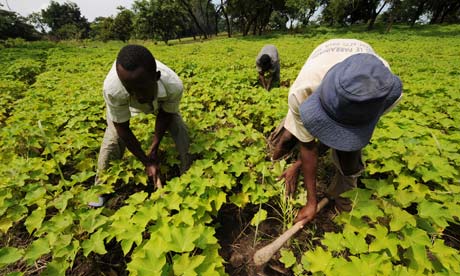
Some biofuels cause more health problems than petrol and diesel, according to scientists who have calculated the health costs associated with different types of fuel.
The study shows that corn-based bioethanol, which is produced extensively in the US, has a higher combined environmental and health burden than conventional fuels. However, there are high hopes for the next generation of biofuels, which can be made from organic waste or plants grown on marginal land that is not used to grow foods. They have less than half the combined health and environmental costs of standard gasoline and a third of current biofuels.
The work adds to an increasing body of research raising concerns about the impact of modern corn-based biofuels.
Several studies last year showed that growing corn to make ethanol biofuels was pushing up the price of food. Environmentalists have highlighted other problems such deforestation to clear land for growing crops to make the fuels. The UK government's renewable fuels advisors recommended slowing down the adoption of biofuels until better controls were in place to prevent inadvertent climate impacts.
Using computer models developed by the US Environmental Protection Agency, the researchers found the total environmental and health costs of gasoline are about 71 cents (50p) per gallon, while an equivalent amount of corn-ethanol fuel has associated costs of 72 cents to $1.45, depending on how it is produced.
The next generation of so-called cellulosic bioethanol fuels costs 19 cents to 32 cents, depending on the technology and type of raw materials used. These are experimental fuels made from woody crops that typically do not compete with conventional agriculture. The results are published online today in the Proceedings of the National Academy of Sciences.
"The dialogue so far on biofuels has been pretty much focused on greenhouse gases alone," said David Tilman, a professor at the department of ecology, evolution and behaviour at the University of Minnesota. "And yet we felt there were many other impacts that were positive or negative not being included. We wanted to expand the analysis from greenhouse gases to at least one other item and we chose health impacts."
The health problems caused by conventional fuels are well studied and stem from soot particles and other pollution produced when they are burned. With biofuels, the problems are caused by particles given off during their growth and manufacture.
"Corn requires nitrogen fertilisers and some of that comes on as ammonia, which is volatilised into the air," said Tilman. "The ammonia particles are charged and they attract fine dust particles. They stick together and form particles of the size of 2.5 micron and that has significant health impacts. Some of this gets blown by prevailing winds into areas of higher population density – that's where you have the large number of people having the health impact which raises the cost."
Health problems from biofuels and gasoline include increased cases of heart disease, respiratory symptoms, asthma, chronic bronchitis or premature death. The team has calculated the economic costs associated with these. "For the economy, it's the loss of good, productive workers who might otherwise have been able to contribute," said team member Jason Hill, an economist at the University of Minnesota's Institute on the Environment.
"These costs are not paid for by those who produce, sell and buy gasoline or ethanol. The public pays these costs," said Dr Stephen Polasky, an economist at the University of Minnesota, also part of the team.
A report published last year by Ed Gallagher, the head of the government's Renewable Fuels Agency, suggested that the introduction of biofuels to the UK should be slowed until more effective controls were in place to prevent the inadvertent rise in greenhouse gas emissions caused by, for example, the clearance of forests to make way for their production.
His report said that if the displacements were left unchecked, current targets for biofuel production could cause a global rise in greenhouse gas emissions and an increase in poverty in the poorest countries by 2020.
Gallagher also suggested the government should introduce incentives to promote the production of next-generation biofuels of the type studied by the Minnesota researchers. So-called cellulosic ethanol can be made from plants such as switchgrass or jatropha that can grow with very little fertiliser on poor land, but the technology to convert these plants into fuels is in its early stages.
Tilman said society needed to make the transition away from corn-based ethanol as soon as possible.
"We've gone one step further than the work that only looked at greenhouse gases and found some surprisingly large effects. Before we dedicate major resources to new biofuels, we should be trying to quantify other likely impacts to society – water quality, biodiversity and so on – and put all of those into our analysis." He hopes this will encourage society to make "a long-term commitment to the right biofuel".

